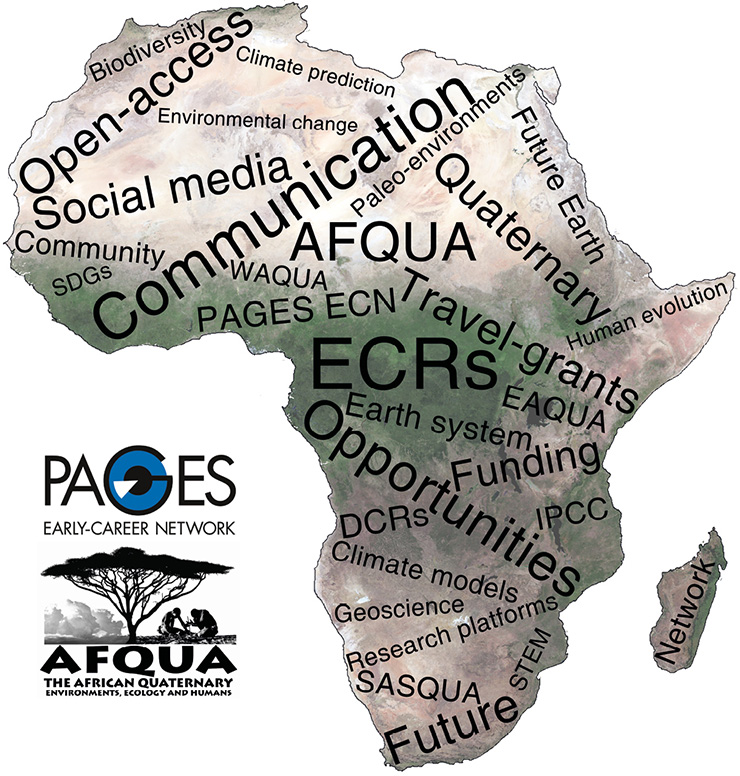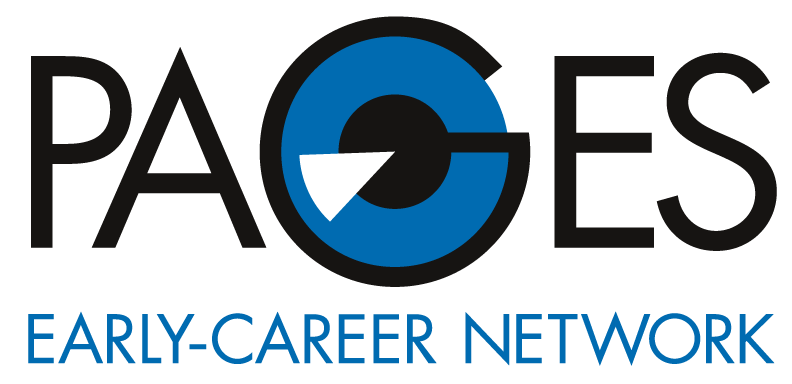- Home
- Publications
- PAGES Magazine
- Quaternary Studies In Africa: a Perspective From Early-career Researchers
Quaternary studies in Africa: a perspective from early-career researchers
AFQUA-PAGES ECN meeting participants
Past Global Changes Magazine
26(2)
82
2018
AFQUA-PAGES ECN meeting participants*
Due to its large longitudinal, latitudinal and also altitudinal extent, the African continent crosses different climate zones and therefore hosts extremely diverse environments, such as tropical glaciers in the equatorial region, hyper-arid deserts in its subtropical latitudes, and Mediterranean ecosystems in its northern and southern fringes. Quaternary scientists have long been attracted to Africa not only because of the natural diversity of its environments, flora, and fauna, but also because Africa is the epicenter of human origins and evolution. Quaternary research in Africa therefore offers a unique opportunity to develop and test our understanding of key components of the Earth system at the intersection of past climate change, environments, and humans.
 |
|
Figure 1: Word cloud summarizing our lively discussions at AFQUA. |
Unfortunately, despite the great interest in African paleoscience research at a global level, it remains very challenging for African early-career researchers (ECRs) to develop a scientific career in studying their own continent. However, things are positively evolving and more possibilities are now becoming available for African ECRs to conduct Quaternary science with, for instance, the new accelerator mass spectroscopy (AMS) facility at iThemba LABS1 in Johannesburg (South Africa) that invites ECRs to receive training in radiocarbon dating and other analyses, or the Pan African Institutes of Science and Technology in Arusha, Tanzania2, and Abuja, Nigeria3, where research-intensive postgraduate and postdoc studies are carried out.
Opportunities to meet the international community are also more abundant, as most international congresses and workshops now offer travel grants (evaluated on a competitive basis at international levels) that are specifically dedicated to ECRs and researchers from developing countries. Participation in meetings like these is not only essential for keeping abreast with the most recent scientific developments, but is also critical for networking purposes. Recently, the African Quaternary Association4 (AFQUA) community started to develop a series of congresses and training workshops based in Africa to bridge the gap between the regional African communities (such as SASQUA, EAQUA and WAQUA) and the more global communities. During its recent edition held in Nairobi, Kenya, in July 2018 (Chase, this issue), the presentations from the speakers and panel discussions brought to the forefront ideas and concerns, and highlighted some areas for future collaborative work. This provides an optimistic view for ECRs as future research leaders on some of the identified research niches.
However, even though opportunities exist, it is often challenging for African-based ECRs to seize them due to barriers in accessing journals, and limited opportunities to engage with scientists and non-scientists. These barriers can be partly alleviated by using social media platforms, such as ResearchGate and Twitter. Although not without their own challenges, these online media platforms represent a great way to network and share your research with local and international stakeholders. Exploring these different facets of communication will undoubtedly widen visibility within the scientific community. Joining international ECR communities can also alleviate the isolation ECRs can experience. The PAGES Early-Career Network5 (PAGES ECN) offers an online platform to encourage discussions, exchange knowledge, and provide specific training. While still in its early phase of development, all the products that will be generated by that network, including, for instance, tips on how to improve your CV, help with applying for travel grants, and methods to communicate your research most effectively, will be accessible online.
We invite all African ECRs to get involved with this network and help build the African ECR community (contact: PAGES.ECN gmail.com (PAGES[dot]ECN[at]gmail[dot]com)).
gmail.com (PAGES[dot]ECN[at]gmail[dot]com)).
There is currently a pressing need to understand past environmental change in Africa, which will inform sustainable development, and offer real solutions, innovations and technology. Although infrastructure challenges exist, initiatives like AFQUA and the PAGES ECN represent unique opportunities that ECRs should seize to develop their position in their own community, to establish and extend long-term collaborations on African-based research, and eventually to become key players in international dialogues. Now is the time for African researchers to become ambassadors of their continent.
affiliations
*Listed alphabetically: M. Chevalier (University of Lausanne, Switzerland); D. Colarossi (Max Planck Institute for Evolutionary Anthropology, Leipzig, Germany); V.J. Hare (University of Cape Town, South Africa); F. Henselowsky (Heidelberg University, Germany); C. Martin-Jones (Cambridge University, UK); H. Moorhouse (Lancaster University, UK); C. Omuombo (University of Nairobi, Kenya); L.J. Quick (Nelson Mandela University, Port Elizabeth, South Africa); E. Razanatsoa (University of Cape Town, South Africa); R. Ssemulende (Makerere University, Kampala, Uganda)
contact
Manuel Chevalier: manuel.chevalier unil.ch
unil.ch
links
4afquacongress.wixsite.com/afqua2018
